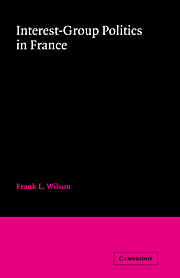Book contents
- Frontmatter
- Contents
- List of figures
- List of tables
- Acknowledgements
- 1 Introduction
- 2 Alternative views of interest-group politics in western democracies
- 3 Interest groups and politics: the non-occupational groups
- 4 Major interest groups: the occupational groups
- 5 Structures of interest-group politics
- 6 Interest-group actions
- 7 Interest-group leaders' attitudes toward interaction with government
- 8 The place of interest groups in French politics
- 9 The French experience and interest-group theory-building
- 10 Conclusions: interest groups and representative democracy in France
- Appendix A Questionnaire
- Appendix B List of groups included in interview sample
- Notes
- Index
10 - Conclusions: interest groups and representative democracy in France
Published online by Cambridge University Press: 05 January 2012
- Frontmatter
- Contents
- List of figures
- List of tables
- Acknowledgements
- 1 Introduction
- 2 Alternative views of interest-group politics in western democracies
- 3 Interest groups and politics: the non-occupational groups
- 4 Major interest groups: the occupational groups
- 5 Structures of interest-group politics
- 6 Interest-group actions
- 7 Interest-group leaders' attitudes toward interaction with government
- 8 The place of interest groups in French politics
- 9 The French experience and interest-group theory-building
- 10 Conclusions: interest groups and representative democracy in France
- Appendix A Questionnaire
- Appendix B List of groups included in interview sample
- Notes
- Index
Summary
In this concluding chapter, I will first compare French interest-group politics in the Fourth and Fifth Republics and in the Gaullist/Giscardian era and the Socialist period of the Fifth Republic. These comparisons over time have two objectives: first, to see if there are indications of trends in changing patterns of government/interest-group interaction, and second, to identify probable causes of these changes. Finally, we will look at the consequences of interest-group/government relations for French representative democracy.
Change and continuity in French interest-group politics
The flirtation of many in political science with group theory during the 1950s produced a number of excellent analyses of the overall pattern of French interest groups during the Fourth Republic. We have already had occasion to refer often to these studies because many of the perceptions of Ehrmann, Lavau, Brown, and Meynaud remain valuable 30 years later. But the changes from this period to the present probably outweigh the elements of continuity, especially in the crucial issue of government/group interaction. This study represents the first major effort to analyze the overall system of interest-group politics during the Fifth Republic. Since the study also extends over the transfer of power in the Fifth Republic from the Right to the Left, it is also possible to look for change in interest-group politics as this major political shift occurred. Here the evidence suggests much more continuity during the Fifth Republic than change.
From the Fourth to the Fifth Republic: a new system of group politics
Under the Third Republic (1872–1940) and the Fourth Republic (1946–58), interest groups grew out of the weakness of other political institutions.
- Type
- Chapter
- Information
- Interest-Group Politics in France , pp. 271 - 285Publisher: Cambridge University PressPrint publication year: 1988



